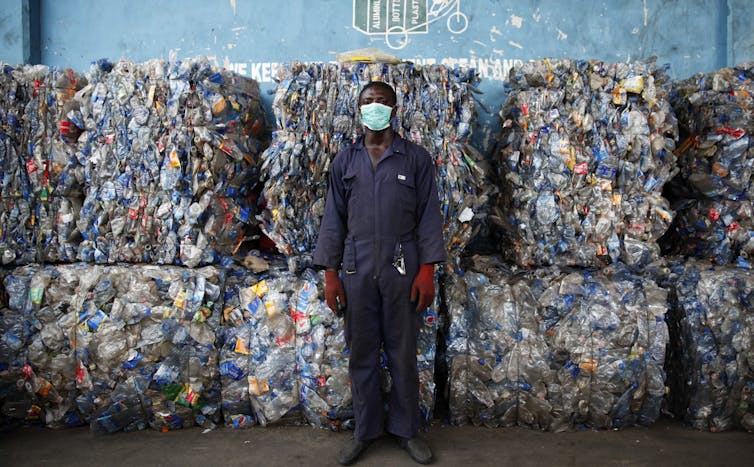Why the pandemic could slash the amount of plastic waste we recycle
A startup in Lagos, Nigeria hopes to help manage the recent deluge of plastic waste. EPA-EFE/AKINTUNDE AKINLEYE
The COVID-19 pandemic has increased the use of plastic medical and protective equipment, such as single-use gloves, masks and aprons. Much of this equipment must be discarded after use to limit the spread of the virus.
But demand for plastic packaging has also spiked in the retail sector, as customers wary of catching the virus shun loose products. Elsewhere, people are using antibacterial wipes and bottles of hand sanitiser at a rapid rate, with some worrying that discarded “COVID waste” could soon outnumber jellyfish in the Mediterranean Sea.
The market for plastic packaging is projected to grow by 5.5% in 2020, causing a surge in the amount of waste being sent for recycling. But just when its services are needed more than ever, the recycling industry has been rocked by crises.
The future of plastics recycling
International travel and industrial activity dried up with the onset of global lockdowns, causing oil demand and prices to plummet. Since most plastic is made from oil, its falling price has meant the cost of plastic resin production has dropped too, making it cheaper than ever to manufacture new plastic products.
Amid a glut of cheap virgin plastic, petrochemical companies could end up churning out even more to stabilise the demand for crude oil. That would make using recycled plastic material economically foolish, as it would contribute to the oversupply haunting the market. With demand for recycled plastic at a record low, the recycling industry may be left with fewer and fewer buyers.
A drop in demand for recycled plastic material would cut into the profit margins of recycling companies. Lower revenue will delay investments in new plants and technologies and limit how effectively the system can improve recycling rates.
Read more: Rubbish is piling up and recycling has stalled – waste systems must adapt
For waste management and recycling companies to turn a profit, the taxpayer would have to bear a greater share of their costs. But will this added burden go down well post-pandemic, with cash-strapped local authorities and widespread redundancies?
The UK government has now pushed back the ban on single-use plastic items from April to October 2020, to ensure supply chains have enough time to source alternative materials for straws, stirrers and cotton buds. If this delay affects the planned implementation of a plastic packaging tax on products with a recycled material content lower than 30%, currently pegged for April 2022, these twin setbacks could threaten the UK’s goal to eliminate all plastic waste by 2043. Businesses would revert to using virgin plastics with little incentive to opt for more expensive recycled materials.
Rescuing the industry
A coordinated effort between governments and the industry could maintain recent progress on recycling rates. Pushing ahead with the ban and new taxes could ensure businesses continue funding the recycling of plastic packaging waste, and using it in the new products they make.
If businesses stick to their targets of replacing some of their virgin plastic material with recycled plastic, regardless of the costs involved, it could help maintain investment in the recycling sector within the UK. But with more plastic waste being treated domestically amid reduced demand for waste in foreign markets, recycling companies in the UK could be overwhelmed with waste they have little financial incentive to process.
Read more: Recycling: poorer countries can now refuse plastic waste imports – this could make the system fairer
Recycling companies and exporters of plastic packaging waste under pressure to deal with more of it may ship it to other countries illegally, or falsely claim they have recycled a higher amount. This information is self-reported, leaving regulation vulnerable to fraud.
And then there’s you, the consumer. We each drive demand for single-use plastic packaging with our buying habits, and we can reduce it and increase recycling rates by purchasing wisely and checking whether the packaging we discard is recyclable or not.
Unwittingly, we bear a significant proportion of the cost of the recycling process via the council taxes we pay. That money can be used to improve services if the burden of waste management is lower. Reduced demand for plastic packaging and better sorting of household waste can, collectively, lead to a more effective and cost-efficient recycling system.
Buying less goods that come with unnecessary plastic packaging, and becoming more mindful of how we separate our plastic waste in the home will improve the efforts of local authorities and the recycling industry, and could also improve the odds that the government meet its ambitious recycling targets on time.
![]()
By Eleni Iacovidou, Lecturer in Environmental Management, Brunel University London and Norman Ebner, Postdoctoral Research Associate in Circular Plastics-Techno-Economics on the Oxford Martin School’s ‘The Future of Plastics’ project, University of Oxford.
This article is republished from The Conversation under a Creative Commons license. Read the original article.
Oxford is a subscribing member of The Conversation.



